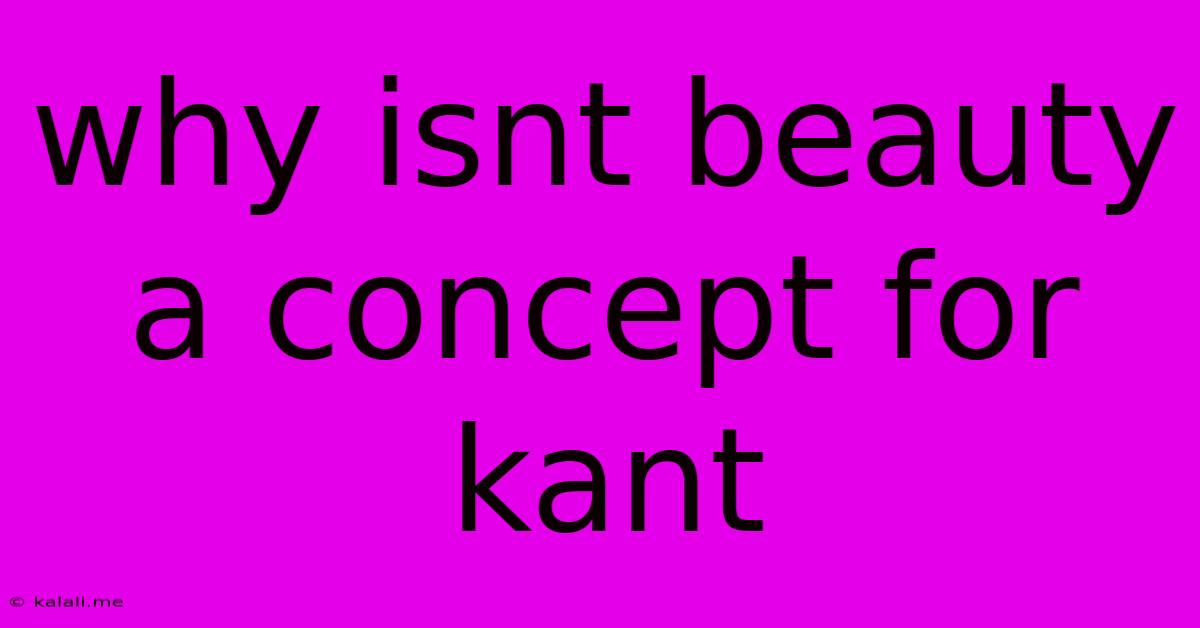Why Isnt Beauty A Concept For Kant
Kalali
Jun 03, 2025 · 3 min read

Table of Contents
Why Isn't Beauty a Concept for Kant? A Deep Dive into Kantian Aesthetics
Kant's philosophy, particularly his aesthetics, often leaves readers pondering its complexities. One such puzzle is his seemingly dismissive attitude towards beauty as a concept. This article explores why Kant doesn't consider beauty a concept, delving into his distinction between judgments of taste and judgments of understanding, the role of disinterestedness, and the limitations of conceptual knowledge in grasping aesthetic experience. Understanding this will provide a clearer picture of Kant's unique approach to aesthetics and the nature of aesthetic judgment.
Kant argues that beauty isn't a concept because it lacks the kind of objective definition that concepts possess. Unlike concepts like "triangle" or "justice," which have specific, definable characteristics, beauty resists such rigid categorization. A judgment of beauty, according to Kant, isn't based on a pre-existing concept that we apply to an object. Instead, it's a judgment of taste, a subjective experience grounded in feeling.
The Distinction Between Judgments of Taste and Judgments of Understanding
Kant draws a crucial distinction between judgments of taste and judgments of understanding (or conceptual judgments). Judgments of understanding are based on concepts and aim at knowledge. We use concepts to categorize and understand the world – a triangle is a three-sided polygon, a just act upholds moral principles. These are objective judgments based on universally applicable rules.
Judgments of taste, on the other hand, are not about knowing something; they are about feeling something. When we judge something as beautiful, we are not stating a fact about the object itself but expressing our subjective feeling of pleasure. This feeling is not derived from a concept but is a singular, immediate experience. This is why Kant emphasizes the disinterestedness of aesthetic judgments.
The Importance of Disinterestedness in Aesthetic Judgment
Disinterestedness is a cornerstone of Kantian aesthetics. It means that our judgment of beauty isn't based on any personal interest or desire. We don't judge a flower beautiful because it's useful, or a painting beautiful because it's expensive. Our pleasure is purely in the object's form, its aesthetic qualities, independent of any practical considerations. This disinterested pleasure distinguishes aesthetic experience from other kinds of experience, such as pleasure derived from satisfying our desires. Because this pleasure is subjective and doesn't rely on a concept, beauty, for Kant, transcends conceptual understanding.
The Limits of Conceptual Knowledge in Aesthetic Experience
Kant believes that concepts are tools of understanding, fitting the world into pre-existing categories. But aesthetic experience is fundamentally different. It’s not about classifying or defining but about encountering something unique and singular that defies easy conceptualization. Trying to force beauty into a conceptual framework would be to miss its essence, reducing the richness of the subjective experience to a dull, objective description. The beauty of a sunset, for example, cannot be fully captured by a scientific explanation; it is felt, not known.
The Free Play of Imagination and Understanding
Instead of concepts, Kant emphasizes the interplay of imagination and understanding in aesthetic judgment. Our imagination freely plays with the form of the object, grasping its perceived unity and harmony. This free play is then judged by our understanding, which assesses whether the form is harmonious and pleasing. The judgement of beauty is not merely an objective determination or subjective whim, but a harmonious synthesis of the subjective response and the structured form.
In conclusion, Kant doesn't consider beauty a concept because it's not something that can be objectively defined or understood through the application of concepts. It is a subjective experience of pleasure, grounded in the free play of imagination and understanding, and characterized by disinterestedness. The attempt to conceptualize beauty would, for Kant, impoverish the experience itself, missing the singular and immediate nature of aesthetic judgment. This unique perspective highlights Kant's profound contribution to understanding the complexities of aesthetic experience and the limits of conceptual knowledge.
Latest Posts
Latest Posts
-
How Come Ashs Pikachu Forget Thunder
Jun 04, 2025
-
Can I Change My House In Hogwarts Legacy
Jun 04, 2025
-
Baptism Of The Holy Spirit And Fire
Jun 04, 2025
-
How To Remove Rust From Grill
Jun 04, 2025
-
What Does Max Health Do In Diep Io
Jun 04, 2025
Related Post
Thank you for visiting our website which covers about Why Isnt Beauty A Concept For Kant . We hope the information provided has been useful to you. Feel free to contact us if you have any questions or need further assistance. See you next time and don't miss to bookmark.